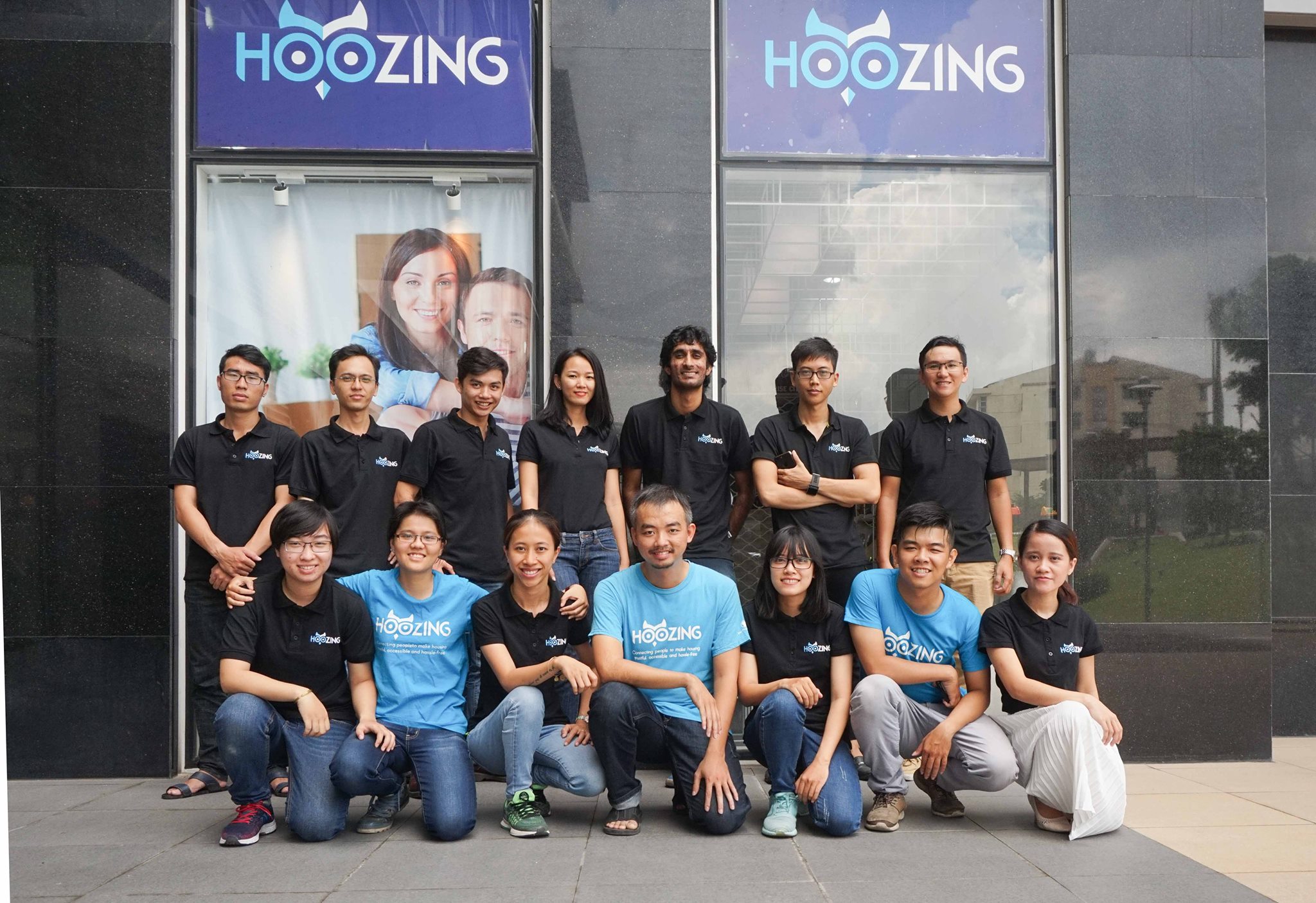
Clockwise: Founders of Hoozing, Loship, Logivan, Med247
2021 was a year of turbulence but also of resilience for Vietnamese startups. Right amid the crisis, the Vietnam startup landscape has seen the birth of its second unicorn – the digital payment firm VNPay.
Also, the recent fundraising success of many homegrown Vietnamese startups such as Loship, Kamereo, and Nano Technologies should send a signal to investors worldwide that the country’s startup ecosystem is well on its way.
Recently, Forbes Asia has released the inaugural 100 to Watch list, which spotlights notable small companies and startups on the rise across the Asia Pacific region.
Among the 100 featured companies, Vietnam has four of its startups selected, operating in the fields of e-commerce, logistics, proptech, and healthtech. Let’s take a deep dive into these four outstanding Vietnamese startups making it to the list.
Hoozing

Founded in 2015 by Hai Le, Hoozing is an online marketplace for searching and renting long-term accommodations. The app provides user reviews, price calculation tools, and digital payment options to speed property leasing and sales. Hoozing claims to have over 50,000 property options, 40,000 users, and 7,000 agents within its ecosystem.
The proptech industry has gained ground in Vietnam in recent years, mostly thanks to the country’s young and tech-savvy population, the continued growth of the real estate market, and increasing digitisation trends. An estimated 100 proptech startups are seeking to capture a market reportedly worth US$500 million.
Also Read: Why Singapore becoming a tech hub is a great boost for the proptech sector
Despite the COVID-19 pandemic rocking the boat, Hoozing confirmed that it earned about US$1.1 million in revenue in 2020, adding the company will become profitable by year-end with US$2 million in revenue.
In May 2020, Hoozing announced an undisclosed amount of funding from the South Korean investment firm Smilegate Investment.
“Our mission is to become a proptech company that brings real value to the real estate industry. From the very beginning, Hoozing has identified people and technology as our core competitive advantage. We have spent five years investing strongly in these two factors, and perhaps this is the time that Hoozing will reap the rewards in Southeast Asia,” CEO Hai Le once shared at The Dot Property Southeast Asia Awards 2020.
Loship

Established in 2017 by Trung Hoang Nguyen, Loship is a one-hour delivery e-commerce platform in Vietnam. The startup’s mission is to give everyone easy access to everything they need in their city in under one hour – from food, groceries, courier, to pharmaceuticals, home necessities, to raw materials.
Its business model is similar to some global players such as US-based DoorDash, Turkey-based Getir, or China-based Meituan Dianping.
COVID-19 has proven to be a blessing in disguise for many Vietnamese startups and delivery companies. Compared to pre-pandemic levels, the number of Vietnamese turning to online shopping has increased by more than 40 per cent.
This along with the dramatic rise of e-commerce has spurred the growth of delivery services. Experts predict that as online shopping becomes more commonplace, demand for online delivery will continue to soar even after the pandemic is brought under control.
“We facilitate the digitisation of over 80,000 Vietnam’s mom-and-pop shops, which bear the brunt of COVID-19. These mom-and-pop stores are like the economic spurs of Vietnam, and we’re here as an online-to-offline platform that bridges the gap between the two.
“Still, what we have accomplished is only a per cent of what we want to achieve. We still have a long way to go and we are continuously improving our services to fulfil the consumers’ demands as best as we can,” Loship CEO Trung Hoang Nguyen shared in a statement.
Recently, Loship announced a US$12 million pre-series C funding round co-led by BAce Capital and the direct investment unit of Sun Hung Kai & Co.
The startup now owns a fleet of over 70,000 drivers and 200,000 merchants, serving nearly two million customers. Covering Vietnam’s main and second-tier cities, Loship is taking on giant rivals such as GoTo and Grab.
Logivan
Established in 2017 by Linh Pham, Logivan’s mission is to digitise the trucking industry and provide a high-quality automatic truck matching system, thereby saving logistics costs for Vietnamese businesses.
Vietnam’s logistics market is in its transition stage and the demand for logistics is rising strongly. Vietnam is in the top three best logistics performers in Southeast Asia, just behind Singapore and Thailand. Still, the sector is highly fragmented with independent truckers and small companies mushrooming over the years.
According to Logivan CEO Linh Pham, the bottleneck of the industry is that about 70 per cent of trucks come back empty after completing a run.
Also Read: 8 things female entrepreneurs in Asia need to know according to Forbes 30 under 30 Michelle Yuan
So, by matching available trucks to cargo loads, Logivan considers itself as the answer to the country’s fragmented highway transportation network.
Logivan has raised US$7.9 million after three funding rounds from many large investment funds, with Indonesia-based Alpha JWC venture fund as its key backer.
“The pandemic will last for one to two years at most, and the recession will only last a few years. But if we look at the long term, every day there is one more driver who knows how to use the app and bid on his own, then that is one day closer to Logivan’s ultimate goal. That is to say, no more empty or idle trucks.”
“At the end of the day, what is more important is that we wake up every day and we don’t forget our mission and efforts in digitising traditional logistics,” Logivan CEO Linh Pham shared on her Linkedin.
Med247

Founded in 2019 by Tuan Truong, Med247 is an offline-to-online health startup that provides round-the-clock tech-driven healthcare services on the app. Med247 operates its own chain of clinics integrated with online healthcare applications that help patients manage their medical records and doctor appointments.
According to YCP Solidance’s report, among Vietnamese startups, the healthtech startup sector is still in its infancy and has ample room for growth, as the sector currently attracts less than two per cent of total investment. COVID-19 has also increased the adoption of healthtech in Vietnam given the limited access to doctors amidst lockdowns and movement restrictions.
This is considered the “golden period” to raise the bar and change the way Vietnamese people take care of their health, especially medical examination and treatment habits.
As the fourth wave of COVID-19 hit Vietnam, Med247 with its hybrid healthcare model has stepped up to help thousands of patients across the country. Its Mental Health Helpline has been strengthened, offering free teleconsultation to patients in need. Currently, there are over 30 doctors on its platform, handling around 400 consultations per day, reported KrASIA.
“Throughout ups and downs, and despite the pandemic, we do see a big shift toward digital healthcare, and always believe in our vision of turning SickCare into Healthcare for families in Vietnam,” co-founder and CEO Med247 Tuan Truong shared on his Linkedin.
Med247 has raised US$1 million with KK Fund, a Singapore-based venture capital investment firm, as its key backer.
–
Editor’s note: e27 aims to foster thought leadership by publishing views from the community. Share your opinion by submitting an article, video, podcast or infographic
Join our e27 Telegram group, FB community or like the e27 Facebook page
Image credit: Duyen Tran
The post Why these four Vietnamese startups made it to the Forbes Asia watchlist appeared first on e27.

